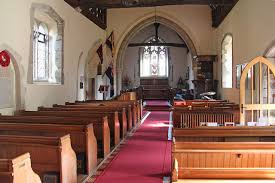Noteworthy Voices at St Simon & St Jude, East Dean, Saturday 21 January 2017
A bitterly cold night but the warmth of the welcome at St Simon and St Jude more than made up for any concerns, and Noteworthy Voices provided us with another superbly balanced programme of a cappella music.
The first half was given over to sacred texts, many from the 16th and 17th centuries, starting with three reflective works. Thomas Mudd’s Let Thy Merciful Ears, O Lord has a quiet dignity before the richer textures of Tallis’ If Ye Love Me, and the wonderfully floated lines of Byrd’s Ave verum. The next section brought us to praise of God with Victoria’s O Quam Gloriosum which seems to pile the musical lines onto each other in a dizzying attempt to raise us to heaven. The same composer’s Jesu Dolcis was more reflective before the high tessitura of Palestrina’s Jesu Rex Admirabilis and the bouncy rhythms of Exultate Deo. Lotti’s Crucifixus is a miracle of condensed emotion, its harmonic palette so challenging it could have been written within the last century. By contrast the recent works by Norwegian composer Ola Gjeilo seemed almost easy on the ear, particularly the slow unfolding of Northern Lights.
The second half brought us to secular settings, opening with three choral songs by Brahms. The six part settings gave the choir a chance to demonstrate different tonal colours, particularly in the final melancholic Darthulas Grabegesang. Saint-Saens’ charming settings of Calme des Nuits and Les Fleurs et les Arbres led us gently towards the lighter end of the evening with folk and popular numbers.
Vaughan Williams’ arrangements of Linden Lea and Just as the tide was turning are none the less welcome for being familiar, and it was a delight to hear James Tomlinson as the bass soloist in The Turtle Dove. He will be missed when he leaves to take us a choral scholarship and we wish him well.
A lovely gentle arrangement of O Waly, Waly led us into Over the rainbow and Tea For Two – and all too soon we were at the end.
Ansy Boothroyd introduced the programme and conducted with subtlety and skill throughout. The different approaches she takes to the end of a piece is particularly noteworthy, with some dying away to silence while other are softly rounded. It is all beautifully crafted and the choir react with exceptional musicality to her shaping of the sound.
We look forward to hearing them again soon.

